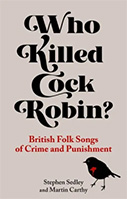Who Killed Cock Robin: British Folk Songs of Crime and Punishment

Authors: Stephen Sedley and Martin Carthy
Publishers: Reaktion Books and the English Folk Dance and Song Society, 2021. 216 pages.
Reviewer: Lars Ole Sauerberg | September 2022
It is customary for historians of crime fiction to plead for the genre’s ancient history. Some historians refer to Old-Testament reports of law infringement and its consequences, beginning with “man’s first disobedience” of God’s rules of behavior in the Garden of Eden, famously treated by John Milton. Others point to the Greek-Roman treatment in the Homeric bronze-age epics, such as the abduction of the beautiful Helen of Troy, or the bloody deeds recounted in classical Greek drama.
Usually crime-fiction historians quickly get into a soberer mood and muster author names from the beginning of the nineteenth century to lay the generic foundations of a genre that came into its own with Edgar Allan Poe in the 1840s and Arthur Conan Doyle in the 1880s. They were assisted by genre runners-up, like William Godwin, Eugène Vidoq, Charles Dickens, and Wilkie Collins, before generic consolidation in the early 20th century.
Of course crime and its consequences have taken up considerable public attention at all times and have also, therefore, been of major thematic interest in literature. This is true not only in crime fiction, but also as the plot motor of conflict in various kinds of narrative. But usually literary histories of crime fiction, as well as literary histories offering more general vistas, pay only scant, if any, attention to the popular-song tradition in a systematic perspective of law violation and its consequences.
This is remedied in the present annotated compilation of British folk songs of crime and punishment. Not that the work attempts to fill in a missing link in crime-fiction literary history, or, for that matter, in the histories of folk song, since this is not at all the aim of the compilators and editors. The aim here, however, is to preserve, and present in thematic fashion, a number of traditional songs belonging primarily to an oral tradition and sharing a preoccupation with legal issues.
When Sir Stephen Sedley, as a law student, in the 1960s rode his hobby horse of research into the British popular-song tradition, this resulted in the song anthology, “The Seeds of Love.” After half a century and an outstanding law career in the UK (barrister, judge, law professor at Oxford), there is now an anthology of folk songs taking their themes from encounters with the law from perspectives of lower social strata than those occupied by the legal profession and before the twentieth century. This is done with the cooperation with the equally distinguished folk singer and musicologist, Martin Carthy.
The two compilators and editors list the songs according to subject matter, dealing, in turn, with “Poaching,” “Affray and Riot,” “Homicide,” “Piracy,” “Arson,” “False Accusation,” “Incest,” “Cheats and Thieves,” “Fratricide,” “Infanticide,” “Sexual Assault,” “Abduction,” “Transportation,” “Prison,” and “The Gallows.”
The volume, which comes with music notation for the songs, a few notes on provenance, and references to current, existing major song collections, ends with the famous song, “Who Killed Cock Robin?,” in which the whole animal kingdom is affected by the death of a tiny bird.
Apart from selecting and securing a number of popular songs dealing with crime and punishment for posterity, the volume indirectly touches on current debates of criminology and penology by offering a historical perspective on often very harsh, severe, and arbitrary law enforcement. Yet it also touches on the interdependence of legal culture and the organization of society.
Lars Ole Sauerberg is a Professor at The University of Southern Denmark.


